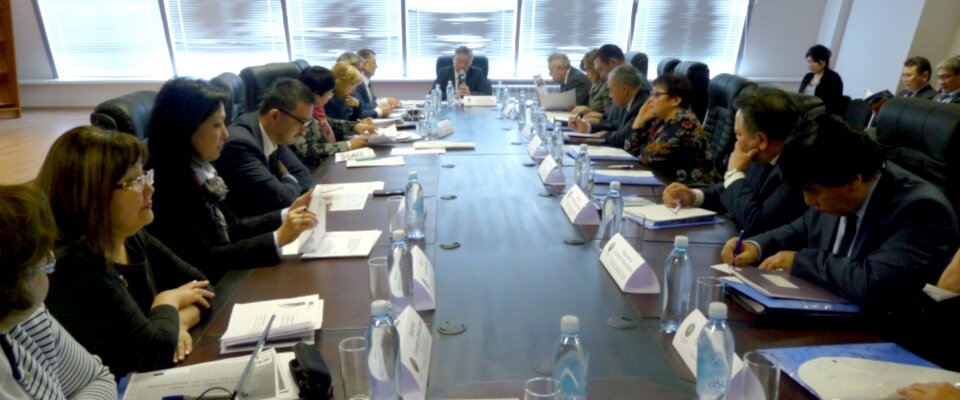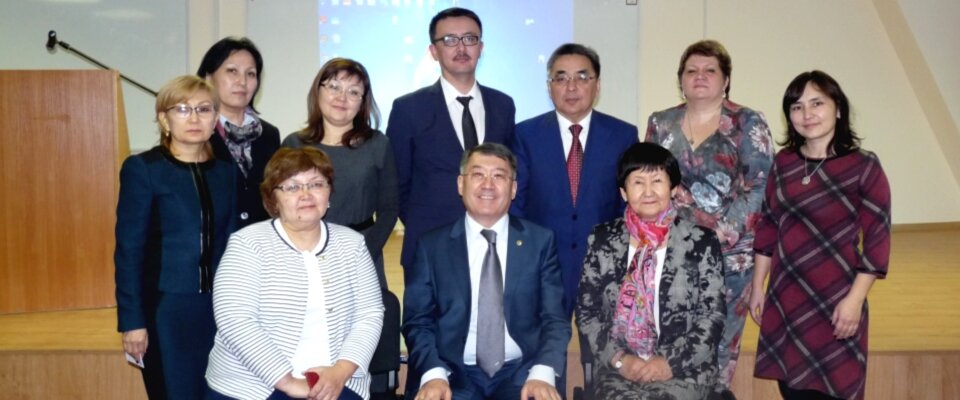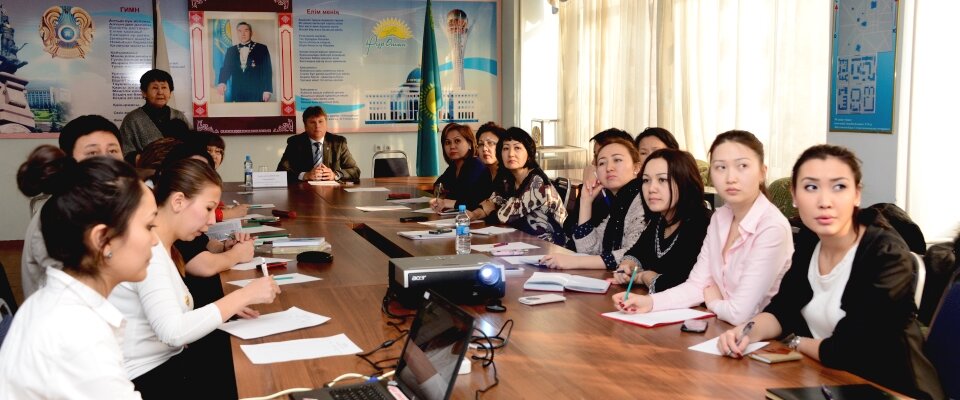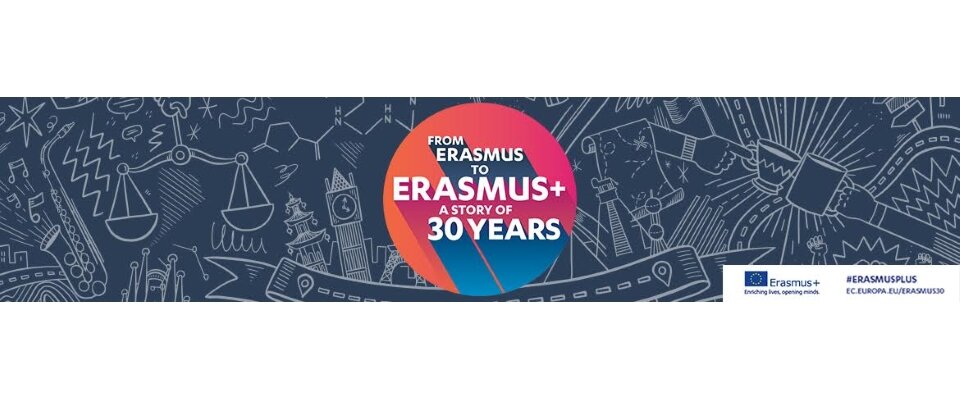ERASMUS+ OBJECTIVES AND FEATURES
Erasmus+is the EU Programme in the fields of education, training, youth and sport for the period 2014-2020. It builds on the achievements of more than 25 years of European programmes in the listed fields, covering both an intra-European as well as an international cooperation dimension.
The Erasmus+ Programme shall contribute to the achievement of:
 The objectives of the Europe 2020 Strategy, including the headline education target;
The objectives of the Europe 2020 Strategy, including the headline education target;
 The objectives of the strategic framework for European cooperation in education and training (ET 2020), including the corresponding benchmarks;
The objectives of the strategic framework for European cooperation in education and training (ET 2020), including the corresponding benchmarks;
 The sustainable development of Partner Countries in the field of higher education;
The sustainable development of Partner Countries in the field of higher education;
 The overall objectives of the renewed framework for European cooperation in the youth field (2010-2018);
The overall objectives of the renewed framework for European cooperation in the youth field (2010-2018);
 The objective of developing the European dimension in sport, in particular grassroots sport, in line with the EU work plan for sport;
The objective of developing the European dimension in sport, in particular grassroots sport, in line with the EU work plan for sport;
 The promotion of European values in accordance with Article 2 of the Treaty on European Union.
The promotion of European values in accordance with Article 2 of the Treaty on European Union.
The following features of the Programme deserve special attention:
 Recognition and validation of skills and qualifications, such as Europass, Youthpass, the European Qualifications Framework (EQF),the European Credit Transfer and Accumulation System (ECTS) and others;
Recognition and validation of skills and qualifications, such as Europass, Youthpass, the European Qualifications Framework (EQF),the European Credit Transfer and Accumulation System (ECTS) and others;
 Dissemination and exploitation of project results
Dissemination and exploitation of project results
 Open access for educational materials, documents and media produced by Erasmus+
Open access for educational materials, documents and media produced by Erasmus+
 International dimension through cooperation with Partner Countries notably in the fields of higher education and youth
International dimension through cooperation with Partner Countries notably in the fields of higher education and youth
 Multilingualism, as one of the cornerstones of the European project and a powerful symbol of the EU's aspiration to be united in diversity
Multilingualism, as one of the cornerstones of the European project and a powerful symbol of the EU's aspiration to be united in diversity
 Equity and inclusion by facilitating the access to learners with disadvantaged backgrounds and fewer opportunities compared to their peers
Equity and inclusion by facilitating the access to learners with disadvantaged backgrounds and fewer opportunities compared to their peers
 Protection and safety of participants involved in the Erasmus+ projects are important principles of the Programme.
Protection and safety of participants involved in the Erasmus+ projects are important principles of the Programme.
Erasmus+ features are presented in more detail on the Commission website: http://ec.europa.eu/programmes/erasmus-plus/index_en.htm
ERASMUS+ ACTIONS
PLEASE, BE AWARE OF: not all the actions are open for partner countries.You will find more information about opportunities for applicants from Kazakhstan at our special section.
In order to achieve its objectives, the Erasmus+ Programme implements the following Actions:
KEY ACTION 1 – MOBILITY OF INDIVIDUALS supports:
 Mobility of learners and staff: opportunities for students, trainees, young people and volunteers, as well as for professors, teachers, trainers, youth workers, staff of education institutions and civil society organizations to undertake a learning and/or professional experience in another country;
Mobility of learners and staff: opportunities for students, trainees, young people and volunteers, as well as for professors, teachers, trainers, youth workers, staff of education institutions and civil society organizations to undertake a learning and/or professional experience in another country;
 Joint Master Degrees: high-level integrated international study programmes delivered by consortia of higher education institutions that award full degree scholarships to the best master students worldwide;
Joint Master Degrees: high-level integrated international study programmes delivered by consortia of higher education institutions that award full degree scholarships to the best master students worldwide;
 Master Student Loan Guarantee: higher education students can get a loan backed up by the Programme to go abroad for a full Master Degree. Students should address themselves to national banks or student loan agencies.
Master Student Loan Guarantee: higher education students can get a loan backed up by the Programme to go abroad for a full Master Degree. Students should address themselves to national banks or student loan agencies.
KEY ACTION 2 – COOPERATION FOR INNOVATION AND THE EXCHANGE OF GOOD PRACTICES supports:
 Transnational Strategic Partnerships aimed to develop initiatives addressing one or more fields of education training and youth and promote innovation, exchange of experience and know-how between different types of organizations involved in education, training and youth or in other relevant fields. Certain mobility activities are supported in so far as they contribute to the objectives of the project;
Transnational Strategic Partnerships aimed to develop initiatives addressing one or more fields of education training and youth and promote innovation, exchange of experience and know-how between different types of organizations involved in education, training and youth or in other relevant fields. Certain mobility activities are supported in so far as they contribute to the objectives of the project;
 Knowledge Alliances between higher education institutions and enterprises which aim to foster innovation, entrepreneurship, creativity, employability, knowledge exchange and/or multidisciplinary teaching and learning;
Knowledge Alliances between higher education institutions and enterprises which aim to foster innovation, entrepreneurship, creativity, employability, knowledge exchange and/or multidisciplinary teaching and learning;
 Sector Skills Alliances supporting the design and delivery of joint vocational training curricula, programmes and teaching and training methodologies, drawing on evidence of trends in a specific economic sector and skills needed in order to perform in one or more professional fields;
Sector Skills Alliances supporting the design and delivery of joint vocational training curricula, programmes and teaching and training methodologies, drawing on evidence of trends in a specific economic sector and skills needed in order to perform in one or more professional fields;
 Capacity Building projects supporting cooperation with Partner Countries in the fields of higher education and youth. Capacity Building projects aim to support organisations/institutions and systems in their modernization and internationalization process. Certain mobility activities are supported in so far as they contribute to the objectives of the project;
Capacity Building projects supporting cooperation with Partner Countries in the fields of higher education and youth. Capacity Building projects aim to support organisations/institutions and systems in their modernization and internationalization process. Certain mobility activities are supported in so far as they contribute to the objectives of the project;
 IT support platforms, such as eTwinning, the European Platform for Adult Learning (EPALE)and the European Youth Portal, offering virtual collaboration spaces, databases of opportunities, communities of practices and other online services for teachers, trainers and practitioners in the field of school and adult education as well as for young people, volunteers and youth workers across Europe and beyond.
IT support platforms, such as eTwinning, the European Platform for Adult Learning (EPALE)and the European Youth Portal, offering virtual collaboration spaces, databases of opportunities, communities of practices and other online services for teachers, trainers and practitioners in the field of school and adult education as well as for young people, volunteers and youth workers across Europe and beyond.
KEY ACTION 3–SUPPORT FOR POLICY REFORMS supports:
 Knowledge in the fields of education, training and youth for evidence-based policy making and monitoring in the framework of Europe 2020, in particular:
Knowledge in the fields of education, training and youth for evidence-based policy making and monitoring in the framework of Europe 2020, in particular:
- country-specific and thematic analysis, including through cooperation with academic networks;
- peer learning and peer reviews through the Open Methods of Coordination in education, training and youth;
 Prospective initiatives to stimulate innovative policy development among stakeholders and to enable public authorities to test the effectiveness of innovative policies through field trials based on sound evaluation methodologies;
Prospective initiatives to stimulate innovative policy development among stakeholders and to enable public authorities to test the effectiveness of innovative policies through field trials based on sound evaluation methodologies;
 Support to European policy tools to facilitate transparency and recognition of skills and qualifications, as well as the transfer of credits, to foster quality assurance, support validation of non-formal and informal learning, skills management and guidance. This Action also includes the support to networks that facilitate cross-European exchanges, the learning and working mobility of citizens as well as the development of flexible learning pathways between different fields of education, training and youth;
Support to European policy tools to facilitate transparency and recognition of skills and qualifications, as well as the transfer of credits, to foster quality assurance, support validation of non-formal and informal learning, skills management and guidance. This Action also includes the support to networks that facilitate cross-European exchanges, the learning and working mobility of citizens as well as the development of flexible learning pathways between different fields of education, training and youth;
 Cooperation with international organizations with highly recognized expertise and analytical capacity (such as the OECD and the Council of Europe), to strengthen the impact and added value of policies in the fields of education, training and youth;
Cooperation with international organizations with highly recognized expertise and analytical capacity (such as the OECD and the Council of Europe), to strengthen the impact and added value of policies in the fields of education, training and youth;
 Stakeholder dialogue, policy and Programme promotion with public authorities, providers and stakeholders in the fields of education, training and youth are necessary for raising awareness about Europe 2020, Education and Training 2020, the European Youth Strategy and other European sector-specific policy agendas, as well as the external dimension of EU education, training and youth policies. They are also essential to stimulate the effective exploitation of the Programme results and generate tangible impact.
Stakeholder dialogue, policy and Programme promotion with public authorities, providers and stakeholders in the fields of education, training and youth are necessary for raising awareness about Europe 2020, Education and Training 2020, the European Youth Strategy and other European sector-specific policy agendas, as well as the external dimension of EU education, training and youth policies. They are also essential to stimulate the effective exploitation of the Programme results and generate tangible impact.
TEMPUS PROJECTS IN KAZAKHSTAN
Currently in the framework of Tempus IV 26 ongoing projects with the involvement of 39 higher education institutions and 34 non-academic partners representing 13 regions of the country are implemented. The total amount of financing is more than 25 million Euro.
In this section you will find the information about TEMPUS
1. List of selected projects with participation of partners from Kazakhstan Tempus IV call VI
2. List of selected projects with participation of partners from Kazakhstan Tempus IV call V
3. List of selected projects with participation of partners from Kazakhstan Tempus IV call IV
4. List of selected projects with participation of partners from Kazakhstan Tempus IV call III
5. List of selected projects with participation of partners from Kazakhstan Tempus IV call II
6. List of selected projects with participation of partners from Kazakhstan Tempus IV 2008
7. Tempus III Projects in Kazakhstan
8. The most active Tempus participants in Kazakhstan
Information about all TEMPUS projects is available at the EACEA website: http://eacea.ec.europa.eu/tempus/results_compendia/projects_description_en.php
Please find more information about projects implemented in Kazakhstan in our publications.























